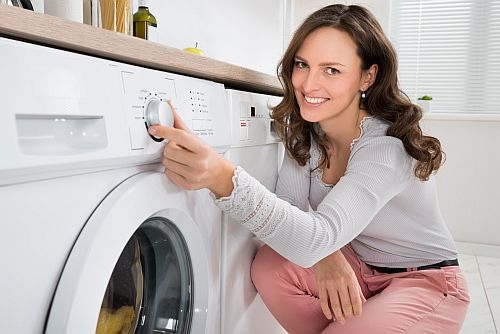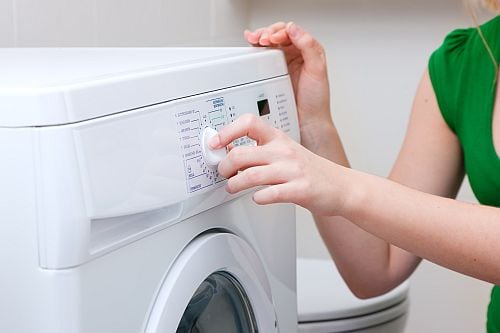Common Washing Machine Problems and Solutions
Posted on March 12, 2017 By Alison PTable of Contents:

- Vibrating Washer
- Leaky Washer
- Noisy Washer
- Washer Won't Run
- Washer Won't Drain
- Detergent Won't Dispense
- Smelly Washer
The next time your washing machine isn't working, try checking all the simple things first before you call for repairs. Troubleshooting can save you a lot of time and money. If you still can't resolve the issue after you have done these simple checks, then it might be time to call professional help.
Whether you have a front load washer or a top load washer, here are some common problems that can occur with your machine and easy solutions to fix them:
My Washer is Vibrating
There are a few possible reasons your washing machine could be vibrating:
- Unbalanced load of laundry
- The washer is not level
- The washer feet may not be locked in and contacting the floor
Solutions:
- Rearrange the load of laundry and be sure that you're loading your washer correctly to avoid shifting. Check your manufacturer's instruction book; inside, you'll find a recommended maximum or optimum load weight. Use that as a guide. When you fill your washer, make sure the clothes still have room to move freely and aren't packed too tightly.
- Check the floor to see if it's level. You may need to add thin piece of plywood under your washer.
- Be sure the washer feet are in firm contact with the floor. Washing machines have adjustable, front leveling legs with a lock nut. You should adjust each leg to the proper height and then tighten the lock nut up against the body of the machine to keep the leg from rotating. After adjusting each leg, lean against the machine and make sure that you feel no movement. Some machines have the same type of legs in the rear that should be adjusted, but most machines have "self-adjusting" rear legs. These legs are set by tilting the entire machine forward onto its front legs with the rear legs about 3 inches off the floor and then setting the machine back down. The legs should adjust automatically.
My Washer is Leaking
If your washer is leaking water, it doesn't automatically mean you need a major repair. Leaking water could happen due to simple issues such as:
- The washer is not balanced or loaded properly
- Hoses are not attached/inserted properly
- Hose washers are worn
- Drains are clogged
Solutions:
- Check to see that your machine is balanced, and make sure the washer basket is not out of alignment.
- Check all your hoses and make sure they are tightened and properly connected. Check the hose washers for cracks or damage
- Check water lines and faucets to ensure they are not leaking.
- Make sure the washing machine is draining properly. If it's not, check the drain hose as it could be clogged with lint, hair, or that missing sock.
My Washer is Making Strange Noises
Weird sounds such as clicking, gurgling or humming can be caused by objects that are caught in the washer, clogged drains, or internal sensors.
Solutions:
- A clicking sound may mean that an object is caught in the washer drain. Be sure to check your drain and remove any objects that have been caught. Make sure to always check and remove items from pockets before washing.
- If your washer is making an unusually loud gurgling noise, this may indicate that the washer drain line is partially clogged. Check the line and remove the blockage before a real problem can occur.
- If you hear a humming or buzzing noise, that may indicate that something has jammed the pump. Check your pump and remove any objects that do not belong. If damage has been done you may need a new pump.
My Washer Will Not Run or Fill With Water
Before you think the worst, there are several simple items you should check first.
- Don't overlook the plug. The first thing you should always check is if the machine is plugged in. It may sound silly but dozens of times this problem has been solved by simply checking the plug.
- If the power cord is plugged in, check to be sure the outlet has power and that your circuit breaker wasn't tripped.
- Check the water supply. Make sure the hoses are attached and both water inlet valves are open. Look for kinks in the hoses and make sure nothing blocking the inlet valve screens.
- Check the inside lid switch. For most washers, the lid must be closed and the lid switch engaged to operate. Make sure there is no lint or dirt on the switch that is causing it to jam.
My Washer Won't Drain or Spin Correctly
Drainage problems are most commonly caused by clogged hoses, improper loading of clothes, obstructions or too much detergent.
Solutions:
- Sometimes items are overlooked even when you have checked pockets before loading your washer. Small items like coins, pens, or even a sock can get caught in the pump or between the basket and tub, blocking draining. Check the pump and between the basket for any unwanted items and remove them.
- Overloading or improper loading will cause the machine to be unbalanced and prevent the washer from spinning correctly. Check your load and adjust by redistributing the wet laundry or removing some laundry to allow the washer to finish spinning.
- Make sure the drain hose has been properly installed. The end of the drain hose should not be higher than 96 inches above the floor.
- Remove and inspect the drain hose for clogs. Before reattaching, be sure to remove any residue from the hose.
- Check to make sure you are using the proper amount of detergent. Using too much detergent causes an overabundance of suds, which will slow the draining process and cause the washer to malfunction.
My Washing Machine Dispensers are Still Full of Detergent
The most common problems with an automatic dispenser malfunctioning is the use of the wrong formula or a lack of cleaning.
Solutions:
- Check your washer manual to make sure you are using the right formula in designated dispensers. If your washer manual instructs you to use liquid bleach, don't use powder bleach.
- Make sure to clean your dispensers every month. Heat a cup of distilled white vinegar and pour it into the dispenser, then run the washer on a regular cycle. The vinegar will clean away any clogs or built-up residue.
 My Washer Smells Funny
My Washer Smells Funny
Washer odors are common, but with simple preventive maintenance, you can keep your washer and laundry smelling clean.
Solutions:
- Once again, make sure you're using the proper amount of detergent. Excessive suds leave dirty residue on washer parts and trap odors.
- Cleaning your washing machine monthly helps prevent smelly residue.
- Check around your washer for mold or mildew growth. There may be an issue with moisture, which must be corrected immediately. Mold and mildew not only smells unpleasant, but it's also dangerous to your health.
Still experiencing problems with your washing machine after following these troubleshooting tips? P.C. Richard & Son is famous for servicing what we sell! If you purchased your washer from us, learn about our repair services here! If you are looking for a new washer, shop our assortment of washers on sale today!